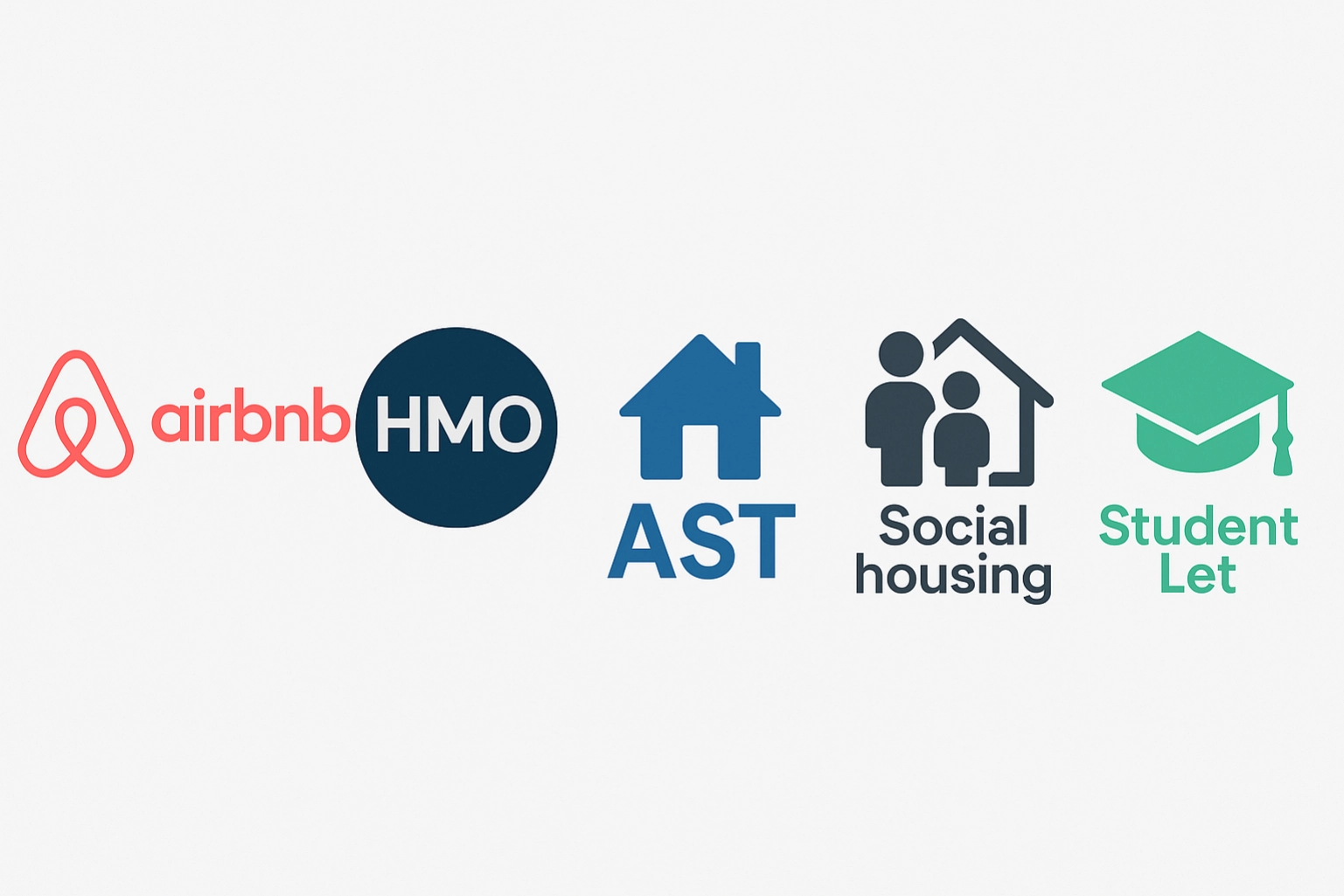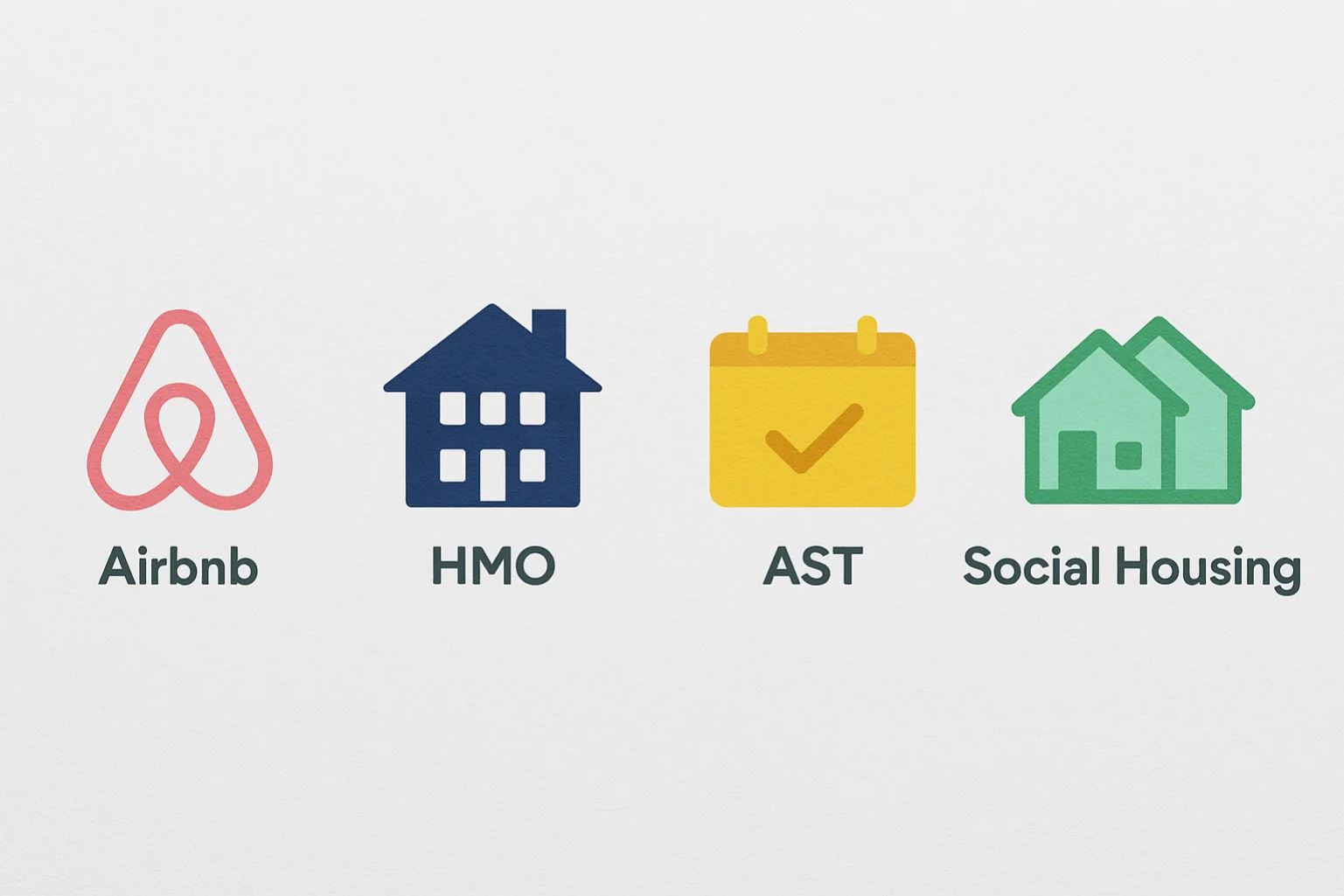A clear, beginner-friendly guide to the five main types of buy-to-let investments – Airbnb, HMO, AST, social housing, and student lets – with pros, cons, example costs, and tips to help you choose. Learn what each option involves and when to speak to a mortgage expert for tailored advice.

Aug 11, 2025

Buying a property to rent out can be a great way to generate income, but not all buy-to-lets are the same. Each type comes with its own rules, potential returns, and risks. If you’re thinking about becoming a landlord, it’s important to understand the main options before you choose one.
At Mortgage Brokers Near Me, we help landlords every day to find the right mortgage for their property – whether it’s a single-family let, a student house, or even an Airbnb. Below, we’ll break down the most common buy-to-let types so you can see which might work for you.
What it is:
A short-term rental where you let the property by the night or week, typically through platforms like Airbnb or Booking.com. Tenants are usually holidaymakers or business travellers.
Pros:
Cons:
Example costs & returns (hypothetical):
Things to consider:
Every buy-to-let strategy comes with its own set of numbers, risks, and rewards – knowing them upfront is key to making the right decision.” – Will Sharman, Mortgage Brokers Near Me
What it is:
A rental property let out to three or more unrelated tenants, each with their own tenancy agreement. Common with young professionals or students.
Pros:
Cons:
Example costs & returns (hypothetical):
Things to consider:
What it is:
The most common type of tenancy in the UK, where the entire property is rented to one household under a fixed-term or rolling contract.
Pros:
Cons:
Example costs & returns (hypothetical):
Things to consider:
What it is:
A property rented to a local council or housing association, which then sublets to tenants on their waiting list.
Pros:
Cons:
Example costs & returns (hypothetical):
Things to consider:

What it is:
A property rented to university students, usually on a per-room basis, with contracts covering the academic year.
Pros:
Cons:
Example costs & returns (hypothetical):
Things to consider:
1. What is the minimum deposit for a buy-to-let mortgage?
Most buy-to-let lenders ask for at least 25% of the property’s value as a deposit, although some may accept 20%. The exact amount depends on your circumstances, credit history, and the type of property you’re buying.
2. Can I live in my buy-to-let property?
No, a buy-to-let mortgage is for rental purposes only. If you want to live in the property, you’ll need a residential mortgage.
3. How is buy-to-let income taxed?
Rental income is taxable, and you must declare it to HMRC. You may be able to deduct certain expenses, such as letting agent fees, repairs, and mortgage interest (subject to current tax rules). Always speak to an accountant for personalised tax advice.
4. Do I need a special licence for an HMO?
Yes, most HMOs require a licence from the local council. The exact requirements vary depending on the number of tenants and the property’s layout.
5. How do lenders decide how much I can borrow for a buy-to-let?
Lenders look at the property’s potential rental income, usually requiring it to be 125–145% of the mortgage interest payments. They’ll also consider your personal income, credit score, and any other debts you have.
6. Can I get a buy-to-let mortgage as a first-time buyer?
Some lenders allow this, but it’s less common and can come with stricter requirements. Speaking to a mortgage broker can help you find lenders open to this option.
7. What happens if I can’t find tenants?
If the property is empty, you won’t earn rental income, but you’ll still have to pay the mortgage and cover other costs like council tax and insurance. Some landlords keep a contingency fund to cover these periods.
8. Are short-term lets like Airbnb riskier than standard tenancies?
Short-term lets can bring in higher income per night, but they also mean more frequent vacancies, cleaning, and guest management. Seasonal demand can also cause income to fluctuate.
9. What is ground rent and service charge, and do they apply to buy-to-lets?
If you’re buying a leasehold property, you may need to pay ground rent and service charges to the freeholder or management company. These costs can reduce your overall profit and should be factored into your calculations.
10. Should I use a letting agent or manage the property myself?
A letting agent can save you time by finding tenants, handling paperwork, and managing maintenance, but they charge a fee. Self-managing can be cheaper but takes more effort and responsibility.
11. Can I switch from residential to buy-to-let?
Yes, but you’ll need to apply for ‘consent to let’ from your lender or switch to a buy-to-let mortgage. Terms and fees will vary.
12. What’s the difference between gross yield and net yield?
Gross yield looks at rental income compared to the property’s value, while net yield accounts for expenses like maintenance, insurance, and mortgage costs. Net yield gives a clearer picture of your true return.

“The best property investment is the one that aligns with your budget, your goals, and your tolerance for risk – not just the highest advertised yield.” – Will Sharman, Mortgage Brokers Near Me
Each type of buy-to-let comes with different costs, income potential, and management needs. Here’s a quick summary to help you understand the basics before speaking to us for tailored advice:
Every investor’s situation is different – from deposit size to location, to how hands-on they want to be.
The best way to know which works for you is to speak to us directly. Our team at Mortgage Brokers Near Me can review your circumstances, explain your mortgage options, and guide you through the process from start to finish.

Is It Worth Going Through a Mortgage Broker? A Complete Guide for Homebuyers in Reading
Read Article
A mortgage deposit is the amount you contribute toward a property purchase before a lender provides the rest. In the UK, deposits usually start from 5%, but the amount you need, where it can come from, and how it must be proven depends on your situation, the lender, and the property type. This guide explains mortgage deposits in plain English, including gifted deposits, proof of funds, common mistakes, and how deposits affect mortgage rates.
Read Article
Your mortgage deposit isn’t just about saving money, lenders want to see where it came from and that it’s legitimate. Whether it’s your own savings, a gifted deposit, or part of a shared ownership scheme, you’ll need to provide proof and meet the minimum percentage required for your mortgage type. Speaking to an expert broker early can make the process smoother and help you avoid delays.
Read ArticleIf you’re buying, moving, or remortgaging, speak with a MBNM adviser and get clear guidance on what’s realistically available to you, before you commit to anything.

